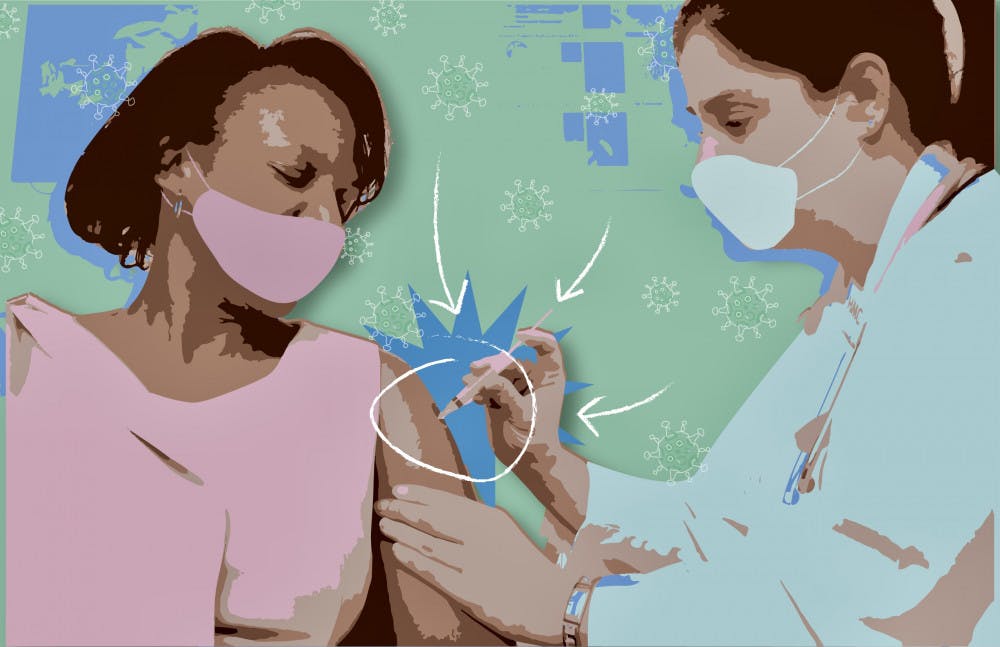As the world anxiously waits for a COVID-19 vaccine, UF Health said it’s developing plans to provide it free of charge for students and staff.
When a vaccine is approved for public use, experts say frontline workers and vulnerable populations will likely receive it first, as it will be in limited supply. But once it’s more widely available, UF plans to provide the vaccine to students and staff on an appointment-only basis, wrote UF Health spokesperson Ken Garcia in an email.
The university couldn’t necessarily force people to get the vaccine.
“UF does not have independent jurisdiction to mandate vaccines,” said UF spokesperson Steve Orlando. “That has to come from the state.”
This month, several pharmaceutical companies announced progress with their COVID-19 vaccines — a sign of hope during a pandemic that has killed more than 250,000 Americans.
“When there is enough available for the general population, our goal is to provide the vaccine at no cost to UF students, faculty and staff,” Garcia wrote.
The vaccine would be available on an appointment-only basis, similar to how the university administers flu vaccines, he wrote. Currently, flu shot appointments can be scheduled virtually through the Student Health Care Center.
Garcia said it’s too early to say how much it will cost the university to acquire the COVID-19 vaccines, because none have been approved for public use yet. Friday, Pfizer, an American pharmaceutical company, submitted its emergency use authorization to the FDA to approve distribution of its vaccine. The request could be approved in December.
Florida’s cases have also been rising since the beginning of October; there were over 10,000 cases recorded Nov. 15, the highest since July. UF’s cases have remained steady in November, with the most recent seven-day average being about 34 cases a day, according to the university’s dashboard.
The Florida Department of Health’s draft vaccination plan divides distribution into three phases: first, health care workers and long-term care residents and staff will receive it, then hospitals and state-mandated vaccination clinics, and finally, health providers like commercial pharmacies, thus making it accessible to the general public.
Historically, vaccine development takes several years — usually about four, wrote Dr. Kartik Cherabuddi, epidemiologist and associate professor of infectious diseases at the UF College of Medicine, in an email.
Pfizer and biotechnology company Moderna are developing the two COVID-19 vaccine frontrunners. Both vaccines are unique because they use mRNA, a molecule in the body that helps with protein synthesis.
Traditionally, vaccines inject either proteins or inactivated bacteria or viruses. Cherabuddi said these vaccines take longer to make. For example, the flu vaccine takes five to six months to produce, he said.
The COVID-19 vaccine administers mRNA, which creates the proteins associated with coronavirus; the body then develops antibodies that recognize these proteins, making it able to fight off the actual coronavirus if the vaccinated person is exposed.
But the new vaccine presents its own challenges; mRNA is unstable, meaning the vaccine must be contained at very cold temperatures during storage and distribution, Cherabuddi said. Pfizer’s vaccine must be stored at -70 degrees Celsius, and Moderna’s at -20 degrees Celsius.
“This COVID-19 vaccine development is a testament to what humankind can do when using single-minded focus among all stakeholders,” Cherabuddi wrote.
Both companies are reporting their vaccines are over 90% effective, far surpassing the FDA’s threshold for approval, which is at least 50% effectiveness. The FDA also strongly recommended vaccine trials include a diverse population of participants before approval.
In both Moderna and Pfizer’s studies, half of their participants were inoculated with the vaccine, while the other half received a placebo.
Wednesday, Pfizer announced its COVID-19 vaccination is 95% effective after participants received two doses over a 28-day period. Monday, Moderna announced its COVID-19 vaccine is 94.5% effective. Neither company reports any side effects associated with their vaccines.
The companies’ studies were only detailed in press releases, not peer-reviewed, scientific journals. But Cherabuddi said the results are reliable, because independent boards reviewed the companies’ data.
Friday, Pfizer submitted its emergency use authorization to the FDA to approve distribution of its vaccine.
At-risk populations will likely start receiving the vaccine by the end of December, said Dr. Anthony Fauci, National Institute of Allergy and Infectious Diseases director, during a press conference Thursday.
“We need to actually double down on public health measures as we’re waiting for that help to come,” Fauci said.
Correction: This story has been updated to reflect that Pfizer’s vaccine has to be stored at -70 degrees Celsius. The Alligator previously reported otherwise.






